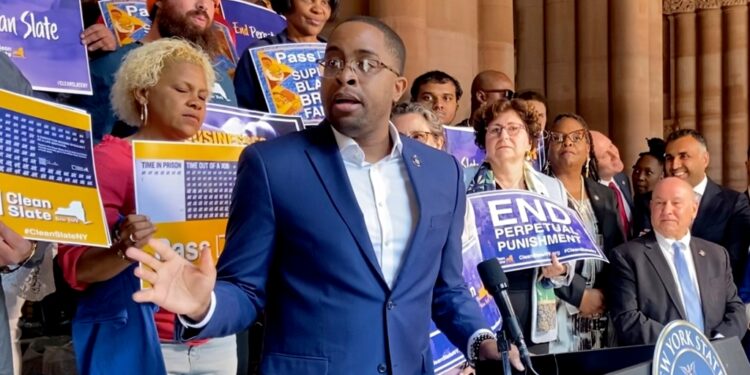ALBANY – Controversial “Clean Slate” legislation will no longer allow murder convictions and other serious felonies to get sealed after Albany Democrats tweaked bill language on Monday.
The proposal would allow convicted people to apply to have their crimes nixed from their records after they serve their sentences, parole, and probation as well as a period of three years for misdemeanors and eight years for felonies.
Narrowing the scope of the bill, which also exempts sex crimes, comes as Albany Democrats near a final deal on passing the bill before the scheduled end of the 2023 legislative session on Friday.
“This is the closest we’ve ever been on Clean Slate,” state Sen. Zellnor Myrie (D-Brooklyn), who is sponsoring the bill, told reporters last week.
“The unprecedented level of support has never crescendoed as it has right now. So … I am cynically cautiously optimistic that we will get this done.”


Assemblywoman Catalina Cruz (D-Queens), who is carrying the bill in her chamber, did not provide immediate comment.
Sex crimes were ineligible under the previous version of the bill, which also includes carve-outs for law enforcement, courts, district attorneys, schools, and the DMV to access records while screening job applicants.
The list of exemptions will now include all Class A felonies except for drug crimes while less serious felonies like manslaughter will remain eligible for sealing.

Gov. Kathy Hochul has expressed support for signing the bill into law once it passes the state Legislature.
But the bill, which has support from organized labor and Big Business, has faced criticism in recent weeks for allowing the vast majority of convictions to be tucked away from the prying eyes of prospective employers as part of efforts to give convicted people a second chance.
“There’s no end to Democrats’ pro-criminal policymaking. Second chances are important, but people have the right to make informed decisions,” Assembly Minority Leader William Barclay (R-Fulton) told The Post last week. “Clean Slate will be another victory for career criminals, and another loss for public safety in New York.”
This is a developing story.







 #truecrime #truecrimecommunity
#truecrime #truecrimecommunity




















